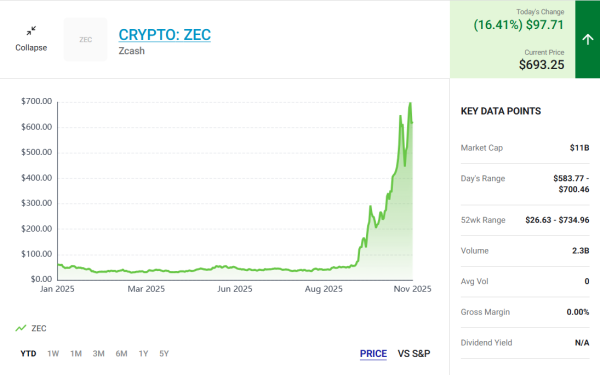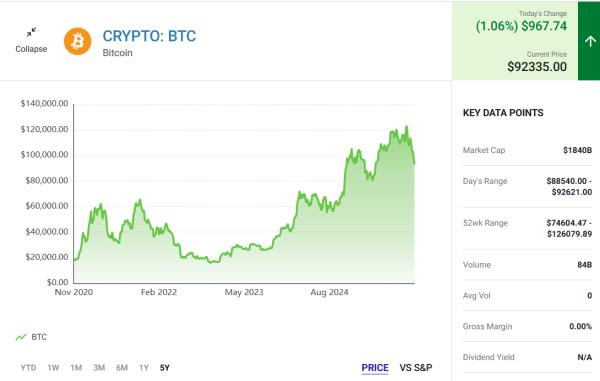In the fast-moving world of cryptocurrencies, a sudden surge can capture headlines, but not every spike signals a shift in dominance. Brokers from Aurudium explore whether Zcash (ZEC), a privacy-focused altcoin, has the potential to challenge Bitcoin (BTC) through 2030.
Over the past month, Zcash has more than doubled in value, while Bitcoin saw a modest pullback. For casual investors, such headlines might spark FOMO, but seasoned brokers caution that short-term gains rarely change the long-term hierarchy of the crypto market.
Zcash has been promoted as a sleeker, more private alternative to Bitcoin, combining Bitcoin-like scarcity with enhanced transaction confidentiality. Supporters argue that these features could attract capital from investors seeking discretion and innovative solutions in the crypto space.
A closer look is needed to separate hype from reality and determine whether Zcash’s recent growth signals a genuine long-term challenge to Bitcoin or is simply another short-lived spike in the volatile cryptocurrency market.
Zcash: A Privacy-Focused Alternative
Zcash has emerged as a privacy-centric altcoin that shares several architectural features with Bitcoin. Both assets have a 21 million coin supply limit and a four-year halving cycle, reducing new coin issuance over time. These predictable supply dynamics are a major reason why investors are drawn to both cryptocurrencies, as limited issuance can create long-term price pressure and potential appreciation.
What sets Zcash apart is its privacy technology. Using zk-SNARKs, Zcash can verify transactions without revealing underlying details, offering a level of discretion unavailable on Bitcoin, where all transaction history is publicly visible on-chain. Proponents of Zcash argue that these privacy features make it a more versatile alternative to Bitcoin, potentially attracting capital from investors concerned about transparency.
Currently, Zcash has a market capitalization of around $10 billion, representing only 0.5% of Bitcoin’s total market cap. Brokers note that while smaller size allows for faster price movements, it does not automatically translate into long-term competitive strength against Bitcoin.
Bitcoin’s Dominance Remains Strong
Despite Zcash’s recent surge, Bitcoin continues to hold significant advantages across distribution, regulatory clarity, and institutional support. It dominates nearly 60% of the total cryptocurrency market, and its deep integration with U.S. spot exchange-traded funds (ETFs) makes it accessible to pension funds, financial advisors, and retail investors without requiring complex crypto infrastructure.
In addition, Bitcoin is increasingly held as a long-term reserve asset by public companies and digital asset treasury (DAT) firms. This institutional base reduces volatility and provides stability that Zcash cannot replicate at present. These structural advantages make Bitcoin a more secure long-term investment compared with smaller, niche cryptocurrencies like Zcash.
Regulatory Challenges for Zcash
Zcash faces significant regulatory hurdles compared with Bitcoin. The European Union plans to ban privacy coins from regulated venues by 2027, and several jurisdictions have already pressured exchanges to de-list privacy-focused assets like Zcash. These restrictions limit its market access and make it difficult for financial institutions to engage with the coin.
Bitcoin, in contrast, enjoys regulatory clarity, institutional acceptance, and a wide array of approved investment vehicles. Brokers emphasize that these factors make Zcash unlikely to rival Bitcoin in terms of adoption, liquidity, or market influence during the next decade.
Investment Implications
For investors, Zcash presents a high-risk, speculative opportunity that could offer significant upside if demand for privacy-focused transactions rises or regulatory restrictions ease. Its unique zk-SNARK privacy technology allows confidential transfers, making it an attractive option for risk-tolerant investors who see value in digital discretion. The recent surge in Zcash’s price demonstrates how smaller altcoins can experience rapid gains, appealing to those willing to embrace volatility for potential reward.
However, these opportunities come with substantial risks. Zcash faces an uncertain regulatory landscape, including plans in the European Union to limit privacy coins on regulated exchanges, which could restrict its market access.
Its limited institutional adoption and small $10 billion market capitalization also mean it lacks the stability and broad support that Bitcoin enjoys. While Zcash may function as a complementary, tactical position, Bitcoin remains the primary long-term asset for capturing digital scarcity and sustainable growth, maintaining its dominance in the crypto market.
Conclusion
While Zcash’s technology and short-term performance are noteworthy, the coin’s path to becoming a Bitcoin alternative is blocked by institutional barriers, regulatory hurdles, and market limitations. Bitcoin continues to offer unmatched stability, infrastructure support, and market penetration, reinforcing its position as the centerpiece of a long-term cryptocurrency strategy.
Investors seeking exposure to alternative cryptos may consider Zcash in small allocations, but Bitcoin remains the primary long-term asset for capturing growth, scarcity, and broad market participation in the digital currency space.











